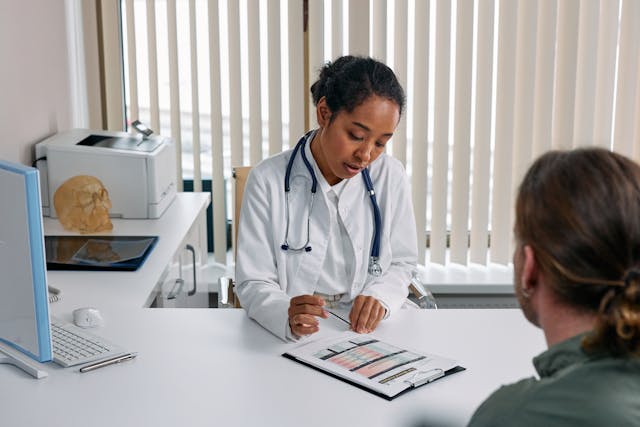Call Today to Schedule an Appointment: 212-319-5282
What to Expect During an Allergy Consultation
An allergy consultation is the first step toward identifying allergic triggers and developing a personalized treatment plan for long-term relief. If you’re struggling with persistent sneezing, nasal congestion, skin irritation, or unexplained coughing, it’s time to consult an allergy specialist. Whether you’re dealing with seasonal allergies, food sensitivities, asthma, or chronic sinus issues, understanding what to expect during your visit can help you feel more prepared and at ease.
Here’s a detailed breakdown of what typically happens during an allergy consultation — especially at a specialized clinic like Allergy, Asthma and Sinusitis P.C. in New York City.

Step 1: A Comprehensive Medical History Review
Your allergist will begin by gathering detailed information about your symptoms and health history. Be prepared to answer questions like:
- When did your symptoms start?
- Do they occur seasonally or year-round?
- Do certain environments, foods, or situations trigger symptoms?
- Are there any other medical conditions or allergies in your family?
- Have you tried any medications, and how well did they work?
The more specific you can be, the easier it is to identify patterns that suggest underlying allergy-related conditions.
Step 2: Physical Examination
A physical exam helps your allergist assess any visible signs of allergic reaction or inflammation. This might include:
- Checking your nasal passages for swelling or blockages
- Listening to your lungs for wheezing or breathing irregularities
- Examining your skin for rashes, hives, or eczema
- Evaluating your eyes for redness or puffiness
These observations guide your allergist in selecting the most appropriate diagnostic tests.
Step 3: Allergy Testing (If Needed)
If your symptoms suggest an allergic response, your allergist may recommend one or more of the following tests:
- Skin Prick Testing: Small amounts of allergens are applied to your skin to check for reactions.
- Intradermal Testing: Used when skin prick testing is inconclusive, involving slightly deeper injections under the skin.
- Blood Tests (IgE Testing): Measures your immune system’s response to specific allergens.
- Patch Testing: Used for contact dermatitis, where allergens are applied to patches placed on your skin for 48 hours.
Your allergist will determine which test is appropriate based on your symptoms, medical history, and current medications.
Step 4: Diagnosis and Explanation
Once test results are available — often the same day for skin tests or within a few days for blood tests — your allergist will explain:
- Which allergens you’re reacting to
- The severity of each reaction
- How your symptoms relate to the test findings
This explanation helps connect the dots between your daily experiences and the allergens affecting your health.
Step 5: Personalized Treatment Plan
Your allergist will create a treatment strategy tailored to your lifestyle and the type/severity of your allergies. This may include:
- Medications: Antihistamines, nasal sprays, inhalers, or epinephrine (for severe reactions)
- Allergen Avoidance Tips: Practical ways to reduce exposure in your home, workplace, and daily routine
- Allergy Immunotherapy: Allergy shots or drops that help reduce your immune response over time
- Asthma Management: If asthma is involved, your treatment will include proper inhaler use and monitoring plans
Education is a major component of your consultation. Your allergist will make sure you understand how to manage symptoms and when to seek emergency care.
What to Bring to Your Appointment
To make the most of your allergy consultation, come prepared with:
- A list of your symptoms and how long they’ve lasted
- Any medications you’re currently taking (including over-the-counter)
- Details about your living and working environment
- Records of past allergic reactions or previous test results
Wearing short sleeves can also make skin testing more convenient.
Next Steps After the Consultation
After your initial visit, your allergist may schedule follow-up appointments to monitor your progress, adjust treatment, or begin immunotherapy. With proper diagnosis and management, you’ll be on your way to living more comfortably — and symptom-free.
Schedule Your Allergy Consultation in NYC
If you’re ready to get answers and take control of your health, schedule a consultation with Dr. Boyan Hadjiev at:
Allergy, Asthma and Sinusitis P.C
Boyan Hadjiev, MD
30 East 40th Street
Suite 1200
New York, NY 10016
212-319-5282
Don’t let allergies disrupt your daily life. A professional allergy evaluation can provide the clarity and relief you’ve been looking for.
Serving all of New York City and the Tri State Area including Zip Codes: Top Allergist NYC Midtown, Chelsea and Clinton: 10001, 10011, 10018, 10019, 10020, 10036 | Gramercy Park and Murray Hill: 10010, 10016, 10017, 10022 | Greenwich Village and Soho: 10012, 10013, 10014 | Lower Manhattan: 10004, 10005, 10006, 10007, 10038, 10280 | Lower East Side: 10002, 10003, 10009 | Upper East Side: 10021, 10028, 10044, 10128 | Upper West Side: 10023, 10024, 10025
